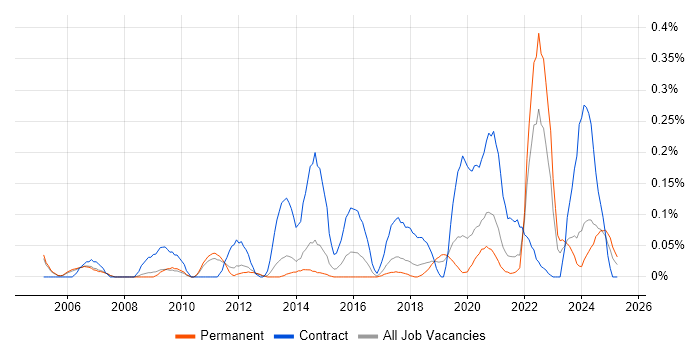Reference Data
North West > Manchester
The table below looks at the prevalence of the term Reference Data in permanent job vacancies in Manchester. Included is a benchmarking guide to the salaries offered in vacancies that cited Reference Data over the 6 months leading up to 5 May 2025, comparing them to the same period in the previous two years.
|
|
6 months to
5 May 2025 |
Same period 2024 |
Same period 2023 |
| Rank |
144 |
- |
- |
| Rank change year-on-year |
- |
- |
- |
| Permanent jobs citing Reference Data |
2 |
0 |
0 |
| As % of all permanent jobs advertised in Manchester |
0.093% |
- |
- |
| As % of the Miscellaneous category |
0.22% |
- |
- |
| Number of salaries quoted |
0 |
0 |
0 |
| Median annual salary (50th Percentile) |
- |
- |
- |
| North West median annual salary |
- |
- |
- |
Reference Data falls under the General and Transferable Skills category. For comparison with the information above, the following table provides summary statistics for all permanent job vacancies requiring generic IT skills in Manchester.
| Permanent vacancies with a requirement for generic IT skills |
892 |
1,749 |
2,207 |
| As % of all permanent jobs advertised in Manchester |
41.43% |
34.09% |
44.42% |
| Number of salaries quoted |
560 |
1,265 |
1,039 |
| 10th Percentile |
£32,500 |
£28,750 |
£35,685 |
| 25th Percentile |
£40,000 |
£40,000 |
£46,250 |
| Median annual salary (50th Percentile) |
£57,250 |
£55,000 |
£57,500 |
| Median % change year-on-year |
+4.09% |
-4.35% |
+5.50% |
| 75th Percentile |
£77,005 |
£68,750 |
£72,500 |
| 90th Percentile |
£87,500 |
£83,759 |
£85,000 |
| North West median annual salary |
£55,000 |
£50,000 |
£55,000 |
| % change year-on-year |
+10.00% |
-9.09% |
+4.76% |

